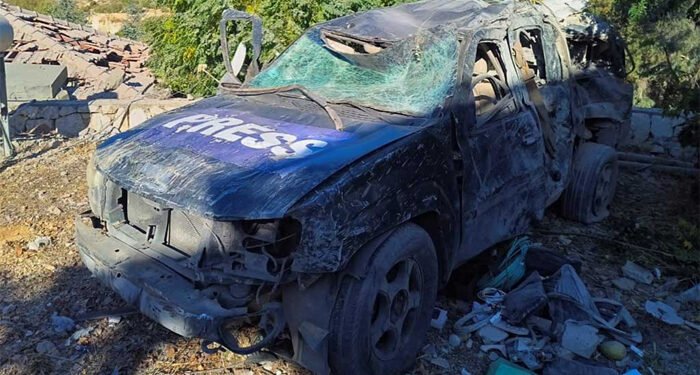Reuters: An Israeli strike killed three journalists in southern Lebanon on Friday, Lebanese officials said, while Israel said Hezbollah killed two people in a strike in its north as Washington pressed for a ceasefire.
US Secretary of State Antony Blinken said there was an urgent need to get a diplomatic resolution to the conflict, a day after he said Washington did not want to see a protracted campaign in Lebanon by its ally Israel.
Israel launched its major offensive in Lebanon a month ago, saying it was targeting the heavily armed, Iran-backed Hezbollah group to secure the return home of tens of thousands of Israelis evacuated from the north due to cross-border rocket attacks.
Beirut authorities say Israel’s Lebanon offensive has killed more than 2,500 people and displaced more than 1.2 million, sparking a humanitarian crisis.
Friday’s strike killed two people in Majd al-Krum in northern Israel, according to Israeli media, and followed a statement from Hezbollah saying that it targeted the northern Israeli town of Karmiel with a large missile salvo.
“The world must stop Iran now – before it’s too late,” Israeli foreign minister Israel Katz said on X.
The conflict was sparked by the Hamas-led Oct 7, 2023 attack on Israel which triggered Israel’s offensive in Gaza, where Palestinian officials said Israeli strikes had killed at least 72 people since Thursday night.
The journalists killed in south Lebanon were Ghassan Najjar and Mohamed Reda of the pro-Iranian news outlet Al-Mayadeen and Wissam Qassem, who worked for Hezbollah’s Al-Manar, the outlets said in separate statements. Several others were wounded.
They had been staying at guesthouses in Hasbaya, a town not previously targeted, when it was hit around 3am (midnight GMT).
Five journalists have been killed in previous Israeli strikes while reporting on the conflict, including Reuters visual journalist Issam Abdallah on Oct 13, 2023.
“This is a war crime,” Lebanese Information Minister Ziad Makary said. At least 18 journalists from six media outlets, including Sky News and Al-Jazeera were using the guesthouses.
“We heard the aeroplane flying very low – that’s what woke us up – and then we heard the two missiles,” Muhammad Farhat, a reporter with Lebanese broadcaster Al-Jadeed, said.
His footage showed overturned and damaged cars, some marked “Press”. There was no immediate comment from Israel, which in general denies deliberately attacking journalists.
The UN peacekeeping mission in Lebanon said Israeli forces had fired at their troops in an observation post in southern Dhayra on Tuesday, leading them to leave the post though they remained at the base.
Israel has denied deliberately targeting the force but says Hezbollah has built strongholds in close proximity to UNIFIL sites. Its previous strikes on UNIFIL posts have drawn international condemnation.
BORDER CROSSING STRUCK
Israel has used airstrikes to pound southern Lebanon, the Bekaa Valley and Beirut’s southern suburbs, and has also sent ground forces into southern Lebanon against Hezbollah.
The military said it struck weapon production sites and Hezbollah’s intelligence headquarters in Beirut as well as Hezbollah targets around the Jousieh border crossing in the northern Bekaa Valley.
It said Hezbollah used the crossing, controlled by the Syrian military, to transfer weapons into Lebanon.
Lebanon’s transport minister Ali Hamieh said the Israeli strike had knocked the Jousieh crossing out of service, leaving the northern route as the only way to Syria.
The UN refugee agency said the strikes were hindering refugees’ attempts to flee. UNHCR spokesperson Rula Amin said some 430,000 people have crossed to Syria since Israel’s campaign started. Lebanon has previously been a major destination for refugees from the Syrian civil war.
“The attacks on the border crossings are a major concern,” Amin said. “They are blocking the path to safety for people fleeing conflict.”
‘REAL URGENCY’
The Israeli campaign spiralled out of a year of cross-border hostilities with Hezbollah, which opened fire on Oct 8, 2023, in solidarity with its Palestinian ally Hamas, a day after it launched the Oct 7 attack.
“We have a sense of real urgency in getting to a diplomatic resolution and the full implementation of UN Security Council Resolution 1701, such that there can be real security along border between Israel and Lebanon,” Blinken said in London.
He said it was important so “people at both sides of the border can have the confidence to… return to their homes”.
Hezbollah has kept fighting despite heavy blows, including the killing of its leader Hassan Nasrallah. Israel said five of its soldiers had been killed in combat in southern Lebanon, after announcing on Thursday the deaths of five others.
The Israeli military said it had uncovered an underground command centre in a village close to the border with Israel and a site concealed in wooded terrain where Kornet anti-tank missiles, launchers, hand grenades and rifles were stored.
Washington has expressed hope that the death of Hamas leader Yahya Sinwar, a mastermind of the Oct 7 attacks, could provide an impetus for an end to fighting.
Officials said on Thursday that US and Israeli negotiators will gather in Doha in the coming days to try and restart talks toward a deal for a ceasefire and the release of hostages in Gaza.
Jordanian Foreign Minister Ayman Safadi, who met Blinken in London, said “ethnic cleansing” was taking place in northern Gaza. Israel denies such accusations, saying it is separating civilians from Hamas militants and moving them to safer areas.
Safadi said: “We are at the moment now where nothing justifies the continuation of the wars. Guns have to go silent.”

























